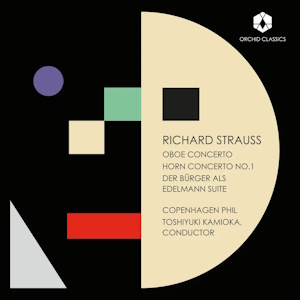
Richard Strauss (1864-1949)
Oboe Concerto, TrV 292 (1945)
Horn Concerto No. 1 in E flat major, Op. 11 (1882-83)
Der Bürger als Edelmann Suite, Op. 60 (1917)
Andreas Fosdal (oboe); Jakob Keiding (horn)
Copenhagen Phil/Toshiyuki Kamioka
rec. 2019/21, Konservatoriets Koncertsal, Frederiksberg, Denmark
Orchid Classics ORC100261 [78]
Three popular works of Richard Strauss comprise this programme, performed by my first encounter with the orchestra. I am familiar with a number of Danish ensembles, but not the Copenhagen Phil as it is called. The name reminds me of the LA Phil which that orchestra seems to be going by lately. I wonder if all such philharmonics are going to be abbreviated as such! In any case, the orchestra seems like a very accomplished ensemble, whose roots can be traced back to 1843, according to the CD note. Here it has reduced numbers of musicians per the scoring of the pieces presented.
The disc opens with the Oboe Concerto, one of Strauss’s last compositions. I have never found this work very appealing in comparison to some of his other late works, such as the Second Horn Concerto. It just seems to go on forever and has basically one mood, though things do perk up in the finale’s main theme and it is orchestrated well enough. If you are an oboist, I am certain you appreciate the piece more than I do. Part of the problem here, though, is the interpretation. Andreas Fosdal is clearly an excellent oboist with a good tone, but the tempos either the conductor or he has chosen are on the sleepy side that result in monotony for the listener. There is a sameness here alongside which Heinz Holliger’s with the Chamber Orchestra of Europe, as just one example, provides more interest. I would have much preferred the inclusion of the shorter Second Horn Concerto, if Jakob Keiding’s performance of its predecessor is anything to go by.
Keiding’s performance of Strauss’s Horn Concerto No. 1 is utterly delightful. I compared this recording with those by such renowned hornists, as Dennis Brain and Hermann Baumann. Based solely on this account, Keiding is clearly in their league. He has a beautiful, smooth tone and all the technique one could wish for. He keeps things light and the orchestra accompanies superbly. The timpani, in particular, make quite an impact, and one can really hear the flute part in the finale. The disc is a keeper for the exuberant performance of this bravura work alone.
The longest piece on the CD is the suite Strauss derived from his incidental music to Hofmannsthal’s Le bourgeois gentilhomme, or Der Bürger als Edelmann (in German).
The main problem is not with the performance itself, which is fine for the most part, but in the disc’s listing of tracks in the booklet and on the back of the cardboard case. The order of the movements is correct, as is the timing of each track. Unfortunately, the actual music does not correspond to the listing. For example, the first track is labeled Overture to Act I, but at 5:43 also includes the Minuet that actually is listed erroneously as track 2. All the other accounts with whose lists I compared get it right: track 1 is about 4+ minutes and track 2, the shorter Minuet. Thus, almost from the beginning the tracking is off. This recording has track 14 as the Prelude to Act II at a whopping 7:29 and the Dinner finale as track 15 at 2:44. The other accounts all list the dinner at 10+ minutes. What is actually heard in the present recording is the finale in both tracks 14 and 15, while track 13 contains the actual Act II Prelude, which is given as the Auftritt des Cleonte and in reality is the previous track. If one is familiar with the music and listens straight through, this will not matter much. However, if the piece is unfamiliar to you, this could be irksome and should be corrected for future pressings.
Toshiyuki and the Copenhagen orchestra characterise the suite very well. I have little qualms with the performance and the recording overall. It is only when I compare it to my favourite version by the Chamber Orchestra of Europe under Erich Leinsdorf (COE) that it comes up a bit short. I have heard a number of accounts of this wonderful work over the years, but none have given me greater pleasure than Leinsdorf’s both for the vibrant performance and outstanding recording. It just has the extra sparkle and pizzazz that’s lacking here, finely performed as it is.
So, my impressions of this new CD are rather mixed, though I find the account of the Horn Concerto quite special. In addition, Joanna Wyld has contributed a sufficiently detailed note on the music and there is useful information on the performers.
Leslie Wright
Help us financially by purchasing from




















